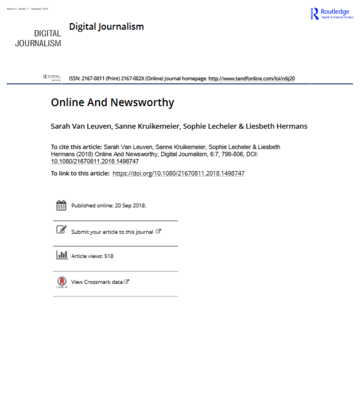
The paper focuses on detailed insights on the use of different kinds of online sources and its implications for news access by different kinds of actors, verification practices for online sources, and the credibility of journalism when it makes use of online sources.
Based on the combined insights of seven studies, the paper explains how this special issue contributes to the developing body of literature investigating whether online sourcing practices have changed journalism, and which questions deserve further attention in future research. The central aim of this special issue is to get a better understanding of whether digitalization has changed journalistic sourcing practices and journalism as a profession. It argues that the different contributions within this issue illustrate that the increasing use of online sources has impacted, yet perhaps not drastically changed, all aspects of journalistic news production.
The first five contributions in this special issue focus on what extent and which online sources are used by professional journalists. Von Nordheim, Boczek, and Koppers, as well as other scholars in this special issue, have provided longitudinal and comparative insights into the use of “new” online sources in journalism. Their work shows that scholars must move beyond using one-shot case studies, and that they need long-term and comparative insights into changes in journalistic practice. However, what the scholars’ work also indicates is that journalists are still in close contact with elite actors, whereas non-elite actors and their stories take a back seat. The results of the insights confirm that Twitter has become a relevant sourcing tool for journalists – mainly as a monitoring tool and as a source of inspiration – but that this has hardly changed relationships with actors.
The studies by Thorsen and Jackson and Chernobrov featured in this special issue focus more on the understanding of how journalists have developed new routines and strategies to verify the credibility of online source. The paper states that the “social aspect” of social media is an important indicator of which actors are seen as more credible. These papers confirm that breaking news or crisis news is one type of news that benefits significantly from the removal of time and space barriers in online sources.
The special issue suggests that future research should aim to better understand journalistic verification strategies for online sources by going beyond survey or interview data.
Tags: Ethics of journalism Social media Fact-checking DigitalisationThe content of this article can be used according to the terms of Creative Commons: Attribution-NonCommercial 4.0 International (CC BY-NC 4.0) . To do so use the the wording "this article was originally published on the Resource Centre on Media Freedom in Europe" including a direct active link to the original article page.

